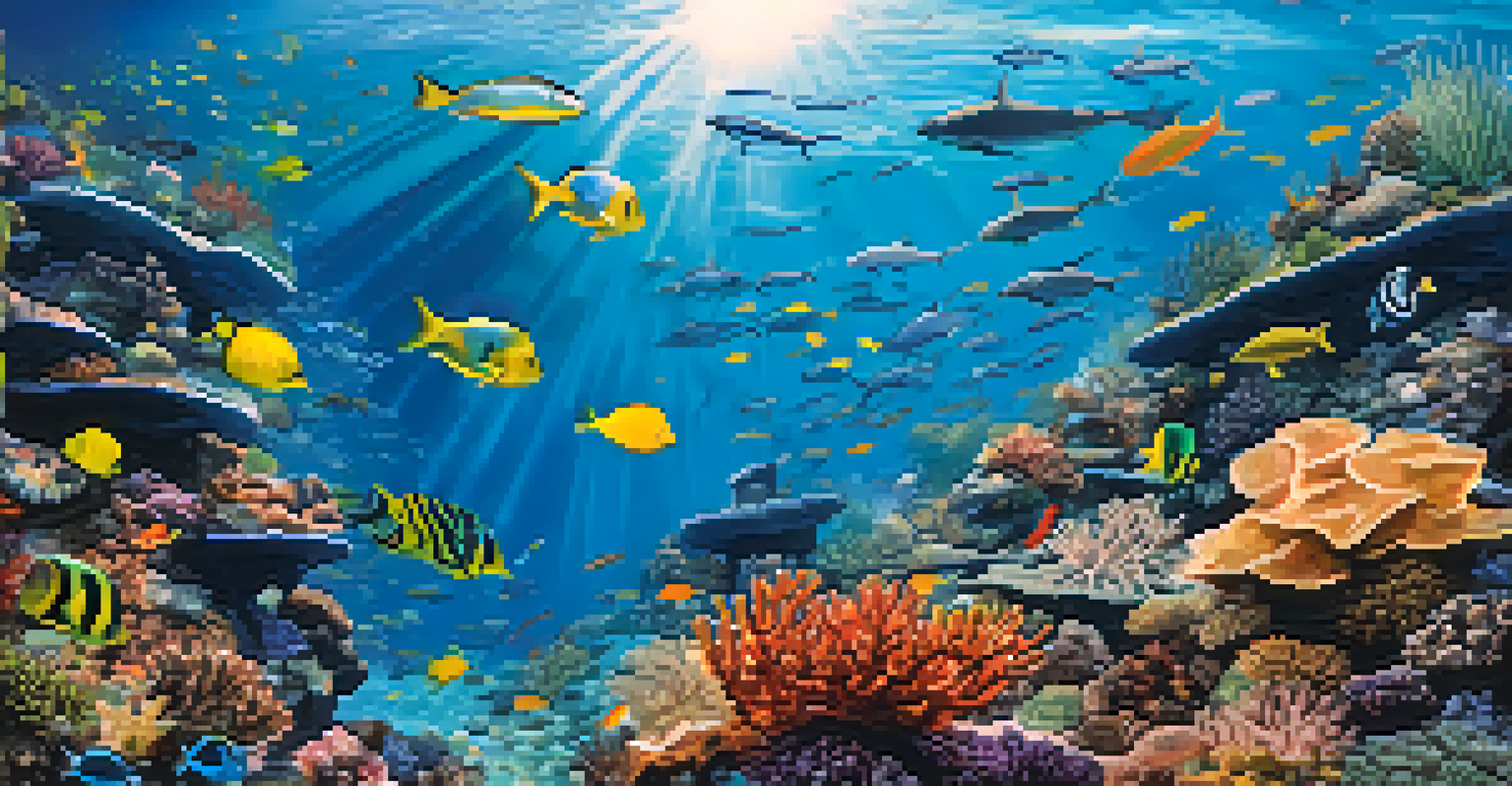The Role of Vegetarianism in Protecting Marine Ecosystems

Understanding Vegetarianism and Its Basics
Vegetarianism is the practice of abstaining from meat consumption, focusing instead on plant-based foods. This lifestyle choice has gained popularity over the years, with many people turning to it for health, ethical, or environmental reasons. By reducing meat intake, vegetarians can help decrease the demand for resource-intensive animal farming.
The greatest threat to our planet is the belief that someone else will save it.
Animal agriculture is a significant contributor to environmental issues, including habitat destruction and pollution. For instance, raising livestock often leads to deforestation, which impacts not just terrestrial ecosystems but also marine ones, as many coastal areas are affected. Thus, embracing vegetarianism can indirectly aid in preserving these vital marine habitats.
Furthermore, the shift toward a plant-based diet encourages sustainable agricultural practices. By prioritizing plants over animal products, we can foster a healthier relationship with our environment, ultimately benefiting marine ecosystems along the way.
The Connection Between Land and Marine Ecosystems
Marine ecosystems are intricately linked to land ecosystems; what happens on land often affects the oceans. For instance, runoff from agricultural land, particularly from livestock farming, introduces pollutants like fertilizers and pesticides into rivers and oceans. This runoff can lead to harmful algal blooms, which deplete oxygen in water and create dead zones.

By adopting vegetarianism, individuals can help reduce the pressure on land ecosystems, thus minimizing harmful runoff. With less intensive livestock farming, there’s a decreased likelihood of chemical runoff entering marine waters. This simple dietary change can play a role in preserving the delicate balance of marine life.
Vegetarianism Benefits Marine Ecosystems
Adopting a vegetarian diet helps reduce the demand for resource-intensive animal farming, ultimately preserving both land and marine habitats.
Moreover, protecting terrestrial ecosystems supports marine biodiversity. Healthy forests and wetlands act as natural filters, preventing pollutants from reaching oceans. Therefore, choosing a vegetarian lifestyle can have a cascading positive effect on the health of marine environments.
Overfishing and Its Impact on Marine Life
Overfishing is one of the most pressing threats to marine ecosystems, leading to the depletion of fish populations and disrupting food chains. When people choose to consume less fish, a direct demand reduction occurs. This shift can help alleviate the pressure on overfished species, allowing populations to recover.
Eating less meat is one of the most effective ways to reduce your carbon footprint.
Transitioning to a vegetarian diet can significantly impact the fishing industry, promoting sustainable practices. With decreased demand for fish, fishermen may turn to alternative practices that are less harmful to marine ecosystems. This shift can lead to healthier ocean environments and more balanced ecosystems.
Moreover, supporting vegetarianism encourages awareness and advocacy for sustainable fishing practices. As more people opt for plant-based diets, there’s an increased emphasis on the importance of protecting marine biodiversity, which ultimately benefits the health of our oceans.
Reducing Carbon Footprint Through Vegetarianism
The carbon footprint of meat production is substantially higher than that of plant-based foods. Livestock farming contributes to greenhouse gas emissions, which are a significant driver of climate change. By choosing vegetarianism, individuals can help lessen their carbon footprints, contributing to global efforts to combat climate change.
Climate change poses a severe threat to marine ecosystems, leading to rising sea temperatures, ocean acidification, and habitat loss. By reducing meat consumption, we can collectively mitigate these impacts, fostering healthier marine environments. Every small effort contributes to the bigger picture of climate action.
Overfishing Relief Through Diet Choices
Choosing to consume less fish can alleviate pressure on overfished species and promote sustainable fishing practices, benefiting ocean health.
Additionally, a vegetarian diet often aligns with sustainable practices, such as reducing food waste and supporting local agriculture. These practices not only benefit the environment but also play a crucial role in protecting marine ecosystems from the indirect effects of climate change.
The Role of Aquaculture in Marine Conservation
Aquaculture, or fish farming, has been proposed as a sustainable alternative to wild fishing. However, it can also have negative impacts on marine ecosystems when not managed properly. By choosing vegetarian diets, consumers can support sustainability in aquaculture by reducing the overall demand for fish, thereby encouraging responsible farming practices.
Many aquaculture operations still rely on wild fish for feed, which can perpetuate overfishing. However, the shift towards plant-based eating can drive innovation in aquaculture, prompting the development of alternative feeds that don’t harm wild fish populations. This can lead to more sustainable aquaculture practices, ultimately benefiting marine ecosystems.
Moreover, promoting vegetarianism encourages a broader conversation about sustainable seafood choices. As awareness grows, the industry may adapt to meet the demands of conscious consumers who prioritize marine conservation.
The Ethical Considerations of Marine Life and Vegetarianism
Many people choose vegetarianism for ethical reasons, including the treatment of animals. This ethical lens extends to marine life, where overfishing and habitat destruction pose significant threats. By embracing a vegetarian lifestyle, individuals can align their values with their eating habits, contributing to the welfare of all living beings.
The ethical implications of consuming seafood are profound, as many fish are caught in ways that are destructive to ocean ecosystems. Choosing to abstain from seafood is a powerful statement against these practices, promoting a more compassionate approach to food choices. This shift not only benefits marine life but also fosters a sense of responsibility towards our planet.
Reducing Carbon Footprint Matters
By opting for plant-based foods, individuals can significantly lower their carbon footprints, contributing to global efforts against climate change that threaten marine life.
Furthermore, the ethical considerations surrounding vegetarianism encourage a deeper connection to the environment. When individuals recognize the impact of their dietary choices, they become more invested in protecting the ecosystems that sustain life, including our precious oceans.
Community and Global Efforts Towards Marine Protection
Adopting vegetarianism can catalyze community and global efforts to protect marine ecosystems. As more individuals make this choice, the collective impact can lead to significant changes in local food systems and policies. Communities can come together to support initiatives that promote sustainable practices and protect marine habitats.
Global efforts towards marine conservation are strengthened by the growing movement towards plant-based diets. Organizations focused on marine protection often advocate for reduced meat consumption as part of their strategies. By supporting these initiatives, individuals become part of a larger movement dedicated to preserving our oceans.

Moreover, community-driven projects, such as beach clean-ups and educational programs, can gain traction through the vegetarian movement. Engaging in these activities can amplify the message of marine conservation, highlighting the connection between dietary choices and environmental sustainability.